Congratulations to Jane Healy and Rosslyn Dray, both in the Department of Social Sciences & Social Work on their publication today in The Journal of Adult Protection. Their paper’ Missing links: Safeguarding and disability hate crime responses’ considers the relationship between disability hate crime and safeguarding adults [1]. It critically considers whether safeguarding responses to disability hate crime have changed following the implementation of the Care Act 2014. Historically, protectionist responses to disabled people may have masked the scale of hate crime and prevented them from seeking legal recourse through the criminal justice system (CJS). This paper investigates whether agencies are working together effectively to tackle hate crime. The authors conclude that raising the profile of disability hate crime within safeguarding teams could lead to achieving more effective outcomes for adults at risk: improving confidence in reporting, identifying perpetrators of hate crimes, enabling the CJS to intervene and reducing the risk of further targeted abuse on the victim or wider community.
Well done!
Prof. Edwin van Teijlingen
CMMPH
Reference:
- Healy, J.C.,Dray, R. (2022), Missing links: safeguarding and disability hate crime responses, The Journal of Adult Protection, Online first ahead of print. https://doi.org/10.1108/JAP-09-2021-0030
Category / Social Work and Social Policy
Record 25 publications on migration & health in Nepal
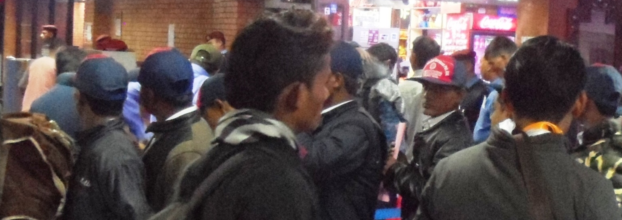 Our team of health and social science researchers reached a record 25 publications focusing on health and migration in Nepal. The team comprises members from three different departments in FHSS. Dr. Preeti Mahato, Post Doctoral Researcher, and Prof. Edwin van Teijlingen are both based in the Department of Midwifery & Health Sciences, Dr. Pramod Regmi, is Senior Lecturer in International Health and Interim Global Engagement Lead in the Department of Nursing Sciences, Dr. Shovita Dhakal Adhikari is Lecturer in Criminology in the Department of Social Sciences & Social Work. Their collaborators include, among others: FHSS Visiting Faculty Prof. Padam Simkhada, Dr. Pratik Adhikary, Dr. Bibha Sinkhada, and Dr. Nirmal Aryal. The team was also instrumental in establishing the ‘‘Health Research Network for Migrant Workers in Asia’. The 25 publications are listed below [1-25].
Our team of health and social science researchers reached a record 25 publications focusing on health and migration in Nepal. The team comprises members from three different departments in FHSS. Dr. Preeti Mahato, Post Doctoral Researcher, and Prof. Edwin van Teijlingen are both based in the Department of Midwifery & Health Sciences, Dr. Pramod Regmi, is Senior Lecturer in International Health and Interim Global Engagement Lead in the Department of Nursing Sciences, Dr. Shovita Dhakal Adhikari is Lecturer in Criminology in the Department of Social Sciences & Social Work. Their collaborators include, among others: FHSS Visiting Faculty Prof. Padam Simkhada, Dr. Pratik Adhikary, Dr. Bibha Sinkhada, and Dr. Nirmal Aryal. The team was also instrumental in establishing the ‘‘Health Research Network for Migrant Workers in Asia’. The 25 publications are listed below [1-25].

References:
- Khatri, R., van Teijlingen, E., Simkhada, P. (2022) The health and well-being of female labour migrants from: A qualitative study of stakeholder views, Europasian Journal of Medical Sciences (EJMS) accepted
- Aryal, N., Sedhain, A., Regmi, P.R., KC, R.K.,& van Teijlingen, E. (2021). Risk of kidney health among returnee Nepali migrant workers: A survey of nephrologists. Asian Journal of Medical Sciences, 12(12), 126–132.
- Aryal, N., Regmi, P.R., Sedhain, A., KC, R.K., Martinez Faller, E., Rijal, A., van Teijlingen, E. (2021) Kidney health risk of migrant workers: An issue we can no longer overlook. Health Prospect 20(1):15-7
- Simkhada, B., Vahdaninia, M., van Teijlingen, E., Blunt, H. (2021) Cultural issues on accessing mental health services in Nepali and Iranian migrants communities in the UK, International Journal of Mental Health Nursing 30(6):1610-1619.
- Khanal, S. P., van Teijlingen, E., Sharma, M. K., Acharya, J., & Sharma, S. (2021).Perceived threats towards COVID-19 pandemic among Nepali migrant workers returned from India. Journal of Health Promotion, 9(01), 87–99.
- Adhikary, P., Aryal, N., Dhungana, R.R., KC, R.K., Regmi, P.R., Wickramage, K.P., Duigan, P., Inkochasan, M., Sharma, G.N., Devkota, B., van Teijlingen, E., Simkhada, P. (2020) Accessing health services in India: experiences of seasonal migrants returning to Nepal. BMC Health Services Research 20, 992. https://doi.org/10.1186/s12913-020-05846-7
- IOM [International Organization for Migration]. (2019) Health vulnerabilities of cross-border migrants from Nepal. Kathmandu: International Organization for Migration.
- Aryal, N., Regmi, P.R., van Teijlingen, E., Trenoweth, S., Adhikary, P., Simkhada, P. (2020) The Impact of Spousal Migration on the Mental Health of Nepali Women: A Cross-Sectional Study, International Journal of Environmental Research & Public Health 17(4), 1292.
- Regmi, P., Aryal, N., van Teijlingen, E., Adhikary, P. (2020) Nepali migrant workers and the need for pre-departure training on mental health: a qualitative study, Journal of Immigrant & Minority Health 22, 973–981.
- Adhikary, P. van Teijlingen, E. (2020) Support networks in the Middle East & Malaysia: A qualitative study of Nepali returnee migrants’ experiences, International Journal of Occupational Safety & Health (IJOSH), 9(2): 31-35.
- Vahdaninia, M., Simkhada, B., van Teijlingen, E., Blunt, H., Mercel-Sanca, A. (2020) Mental health interventions and services for Black, Asian & Minority Ethnics (BAME) in the UK: a scoping review, Mental Health & Social Inclusion 24(2): 81-95.
- Regmi, P., van Teijlingen, E., Mahato, P., Aryal, N., Jadhav, N., Simkhada, P., Syed Zahiruddin, Q., Gaidhane, A., (2019) The health of Nepali migrants in India: A qualitative study of lifestyles and risks, Journal of Environmental Research & Public Health 16(19), 3655; doi:10.3390/ijerph16193655.
- Dhungana, R.R., Aryal, N, Adhikary, P., KC, R., Regmi, P.R., Devkota, B., Sharma, G.N., Wickramage, K., van Teijlingen, E., Simkhada, P. (2019) Psychological morbidity in Nepali cross-border migrants in India: A community-based cross-sectional, BMC Public Health 19:1534 https://bmcpublichealth.biomedcentral.com/articles/10.1186/s12889-019-7881-z
- Aryal, N., Regmi, P.R., van Teijlingen, E., Simkhada, P., Mahato, P. (2019) Adolescents left behind by migrant workers: a call for community-based mental health interventions in Nepal. WHO South East Asia Journal of Public Health 8(1): 38-41.
- Aryal, N., Regmi, P.R., Faller, E.M,, van Teijlingen, E., Khoon, C.C., Pereira, A., Simkhada, P. (2019) ‘Sudden cardiac death and kidney health related problems among Nepali migrant workers in Malaysia’ Nepal Journal of Epidemiology 9(3): 755-758. https://www.nepjol.info/index.php/NJE/article/view/25805
- Adhikary P, van Teijlingen E., Keen S. (2019) Workplace accidents among Nepali male workers in the Middle East and Malaysia: A qualitative study, Journal of Immigrant & Minority Health 21(5): 1115–1122. https://link.springer.com/article/10.1007/s10903-018-0801-y
- Simkhada, P.P., van Teijlingen, E.R., Gurung, M., Wasti, S. (2018) A survey of health problems of Nepalese female migrants workers in the Middle-East & Malaysia, BMC International Health & Human Rights 18(4): 1-7. http://rdcu.be/E3Ro
- Adhikary P, Sheppard, Z., Keen S., van Teijlingen E. (2018) Health and well-being of Nepalese migrant workers abroad, International Journal of Migration, Health & Social Care 14(1): 96-105. https://doi.org/10.1108/IJMHSC-12-2015-0052
- Adhikary, P, Sheppard, Z., Keen, S., van Teijlingen, E. (2017) Risky work: accidents among Nepalese migrant workers in Malaysia, Qatar & Saudi Arabia, Health Prospect 16(2): 3-10.
- Simkhada, P.P., Regmi, P.R., van Teijlingen, E., Aryal, N. (2017) Identifying the gaps in Nepalese migrant workers’ health and well-being: A review of the literature, Journal of Travel Medicine 24(4): 1-9.
- Aryal, N., Regmi, P.R., van Teijlingen, E., Simkhada, P., Adhikary, P., Bhatta, Y.K.D., Mann, S. (2016) Injury and Mortality in Young Nepalese Migrant Workers: A Call for Public Health Action. Asian-Pacific Journal of Public Health 28(8): 703-705.
- Sapkota, T., Simkhada, P., van Teijlingen, E. (2014) Nepalese health workers’ migration to United Kingdom: A qualitative study. Health Science Journal 8(1):57-74.
- Adhikary P, Keen S and van Teijlingen E (2011). Health Issues among Nepalese migrant workers in the Middle East. Health Science Journal.5(3):169-i75 DOI: 2-s2.0-79960420128.
- van Teijlingen E, Simkhada, P., Adhikary, P. (2009) Alcohol use among the Nepalese in the UK BMJ Rapid Response: www.bmj.com/cgi/eletters/339/oct20_1/b4028#223451
- Adhikary, P., Simkhada, P.P., van Teijlingen E., Raja, AE. (2008) Health & Lifestyle of Nepalese Migrants in the UK, BMC International Health & Human Rights 8(6). Web address: www.biomedcentral.com/1472-698X/8/6
New BU publication on academic writing
Congratulations to Dr. Orlanda Harvey in the Department of Social Sciences & Social Work, Dr. Pramod Regmi in the Department of Nursing Science and FHSS Visiting Faculty Jillian Ireland, Professional Midwifery Advocate in Poole Maternity Hospital (UHD/University Hospitals Dorset NHS Foundation Trust) whose paper ‘Co-authors, colleagues, and contributors: Complexities in collaboration and sharing lessons on academic writing‘ was published today.[1] 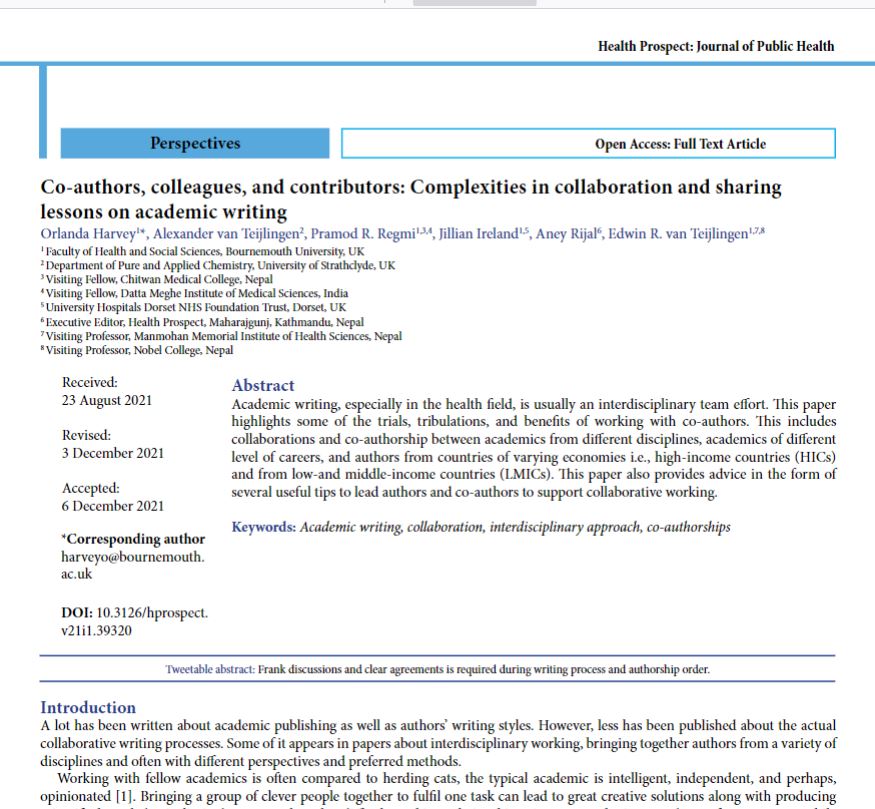
The paper argues that academic writing, especially in the health field, is usually an interdisciplinary team effort. It highlights some of the trials, tribulations, and benefits of working with co-authors. This includes collaborations and co-authorship between academics from different disciplines, academics of different level of careers, and authors from countries of varying economies i.e., high-income countries (HICs) and from low-and middle-income countries (LMICs). This paper also provides advice in the form of several useful tips to lead authors and co-authors to support collaborative working. Our other co-authors are: Aney Rijal, postgraduate student and Executive Editor of the journal Health Prospect based in Nepal, and Alexander van Teijlingen postgraduate student in the Department of Pure and Applied Chemistry (University of Strathclyde, Glasgow, Scotland).
Prof. Edwin van Teijlingen
Centre for Midwifery, Maternal & Perinatal Health
Reference:
- Harvey, O., van Teijlingen, A., Regmi, P.R., Ireland, J., Rijal, A., van Teijlingen, E.R. (2022) Co-authors, colleagues, and contributors: Complexities in collaboration and sharing lessons on academic writing Health Prospect 21(1):1-3.
Research papers: A game of Happy Families
 Recently I completed a game of Happy Families, to be more precise I added a paper with my fourth family member to a ‘collection’. I got the idea from Prof. Jonathan Parker and Prof. Sara Ashencaen Crabtree (both based in the Department of Social Sciences & Social Work) who published a paper with their children a few years ago [1]. When Jonathan told me about this achievement I had already published two dozen of scientific and practitioners’ papers with my partner Jilly Ireland, Professional Midwifery Advocate in University Hospitals Dorset NHS Foundation Trust and FHSS Visiting Faculty (for example 2-5).
Recently I completed a game of Happy Families, to be more precise I added a paper with my fourth family member to a ‘collection’. I got the idea from Prof. Jonathan Parker and Prof. Sara Ashencaen Crabtree (both based in the Department of Social Sciences & Social Work) who published a paper with their children a few years ago [1]. When Jonathan told me about this achievement I had already published two dozen of scientific and practitioners’ papers with my partner Jilly Ireland, Professional Midwifery Advocate in University Hospitals Dorset NHS Foundation Trust and FHSS Visiting Faculty (for example 2-5).
Two years ago, Dr. Preeti Mahato (in the Centre for Midwifery, Maternal & Perinatal Health) and I published a paper with my middle son about ‘Vaping and e-cigarettes: A public health warning or a health promotion tool?’ [6]. The following year, Prof. Hamid Bouchachia (Faculty of Science & Technology) and I co-authored a paper with my oldest son on AI and health in Nepal [7], followed by a paper this year on academic publishing with FHSS’s Dr. Shovita Dhakal Adhikari (Department of Social Sciences & Social Work , Dr. Nirmal Aryal (CMMPH) and Dr. Pramod Regmi (Department of Nursing Sciences [8]. And to complete the four family members in the Happy Families set, I published a paper late last month with my daughter under the title ‘ Understanding health education, health promotion and public health’ [9].
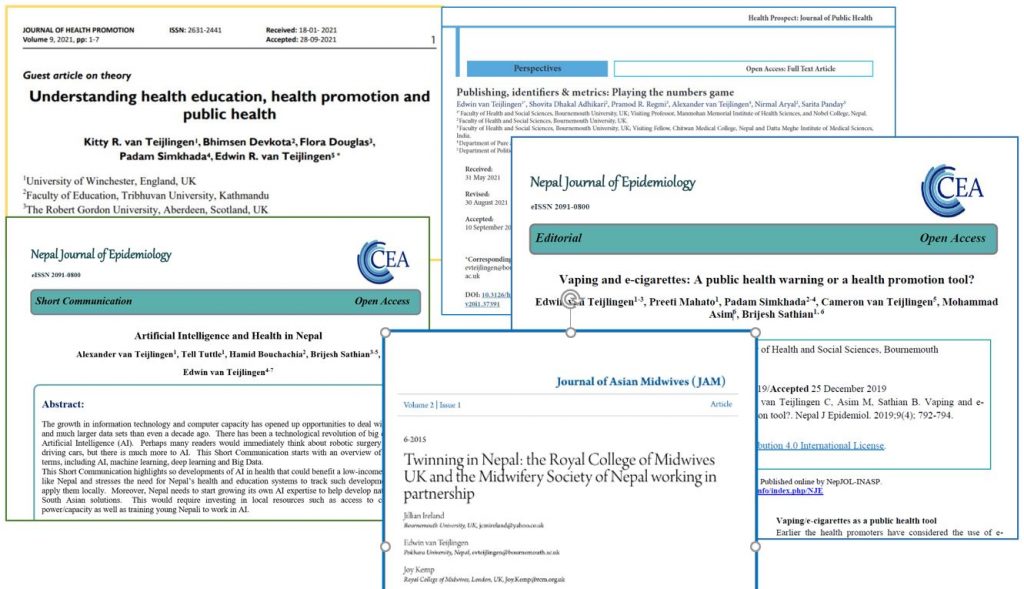
References:
- Parker, J., Ashencaen Crabtree, S., Crabtree Parker, M. and Crabtree Parker, I., 2019. ‘Behaving like a Jakun!’ A case study of conflict, ‘othering’ and indigenous knowledge in the Orang Asli of Tasik Chini. Journal of Sociology and Development, 3 (1): 23-45.
- Ireland, J., Bryers, H., van Teijlingen E., Hundley, V., Farmer, J., Harris, F., Tucker, J., Kiger, A., Caldow, J. (2007) Competencies and Skills for Remote & Rural Maternity Care: A Review of the Literature, Journal of Advanced Nursing, 58(2): 105-115.
- van Teijlingen E., Simkhada, P., Ireland, J. (2010) Lessons learnt from undertaking maternity-care research in developing countries. Evidence-based Midwifery 8(1): 12-6.
- Ireland, J., van Teijlingen, E, Kemp J. (2015) Twinning in Nepal: the Royal College of Midwives UK and the Midwifery Society of Nepal working in partnership, Journal of Asian Midwives 2 (1): 26-33. http://ecommons.aku.edu/jam/vol2/iss1/5/
- Ireland, J., Khashu, M., Cescutti-Butler, L., van Teijlingen, E, Hewitt-Taylor, J. (2016) Experiences of fathers with babies admitted to neonatal care units: A review of literature, Journal of Neonatal Nursing 22(4): 171–176.
- van Teijlingen, E., Mahato, P., Simkhada, P., van Teijlingen, C., Asim, M., & Sathian, B. (2019). Vaping and e-cigarettes: A public health warning or a health promotion tool? Nepal Journal of Epidemiology, 9(4), 792-794. https://doi.org/10.3126/nje.v9i4.26960
- van Teijlingen, A., Tuttle, T., Bouchachia, H., Sathian, B., & van Teijlingen, E. (2020). Artificial Intelligence and Health in Nepal. Nepal Journal of Epidemiology, 10(3), 915–918. https://doi.org/10.3126/nje.v10i3.31649
- van Teijlingen, E.R., Dhakal Adhikari, S., Regmi, P.R., van Teijlingen, A., Aryal, N., Panday, S. (2021). Publishing, identifiers & metrics: Playing the numbers game. Health Prospect, 20(1). https://doi.org/10.3126/hprospect.v20i1.37391
- van Teijlingen, K., Devkota, B., Douglas, F., Simkhada, P., van Teijlingen, E. (2021) Understanding health education, health promotion and public health, Journal of Health Promotion 9(1):1-7. https://www.nepjol.info/index.php/jhp/article/view/40957
Expert in Health Service Accessibility
Received a lovely tweet this Sunday morning from Expertscape, an organisation in the USA, announcing that: ” As part of International Universal Health Coverage Day (Dec 12, 2021), we congratulate Dr. Edwin R van Teijlingen of Bournemouth University — Recognized as an Expertscape Expert in Health Services Accessibility”. Expertscape ranks the world’s top experts in Clinical and Research Medicine.

Exhibition of public involvement in research
Mel Hughes, Angela Warren and Vanessa Heaslip are collaborating with Yeovil Hospital on an NIHR funded project to showcase the involvement of people with lived experience in health and social care research. This may have been as a participant, public contributor or co-researcher. If you know anyone who might be interested in taking part, please see below.
Invitation to participate in our forthcoming exhibition.
My name is Janine Valentine and I am a nurse consultant at Yeovil Hospital in Somerset.
Working in collaboration with the Department of Nursing Science and the PIER partnership at Bournemouth University, I am currently developing an exhibition which has been funded by the National Institute of Health Research and which aims to promote the importance of participating in research
This is planned to take place in March 2022 across a number of venues within the Southwest
What will people see at the exhibition?
We are aiming to create a beautiful, inspiring and thought provoking exhibition, showcasing the stories of a number of individuals who have been involved in research. The wider purpose of the exhibition is to raise the profile of research and those who participate within it, with a view to encouraging others to sign up and get involved.
Who will be involved?
We would love to hear from people who have participated in ay health or social care related study who would be interested in taking part in the exhibition. We are keen for the exhibition to provide a rich and interesting story, reflecting both the variety of research study and the diversity of individuals who participate. We are particularly interested in hearing from people whose voices may be less frequently heard. Research affects all of us in some way and it is important that everyone has an opportunity to be part of it whatever their situation or background.
The exhibition will provide an opportunity for a wider audience to learn more about the various ways in which they can become involved in research and how valuable their contribution would be.
If I think I can contribute, what do I need to do?
As a participant, we would like to meet with you to hear your story about your involvement in research. In order to do this, we would make initial contact by phone to discuss the project and answer any questions you may have. We would then arrange to meet with you in person. This would consist of myself and a professional photographer travelling to meet you at a suitable location where we would record your story and take your photograph. We would expect this to take around an hour.
Your story would then be written up to be exhibited alongside your photograph. In some cases, we might create an audio recording of your story. Before any inclusion in the exhibition these would be shared with you to ensure that you were happy with them and amendments would be made in accordance with your wishes.
We are offering participants a payment of a £20 voucher for their time.
We plan to tour the exhibition to a variety of public spaces end events such as local libraries, hospitals as well as Bournemouth University. As participants your shared voices will be an amazing way through which to inspire others to get involved and celebrate the importance of research.
If you would like to participate or learn more about this project please contact me via Janine.valentine@ydh.nhs.uk or 07523 949730
NIHR Bulletin

RDS NEWS
From the RDS desk – Is research really for everyone?
The definition and scope of equality, diversity and inclusion (EDI) is often misunderstood, and limited to only considering ethnicity and gender. In reality, EDI is about involving so many more groups, and avoiding potential language barriers and digital exclusion.
The Research Design Service blog this month explores EDI, and makes you ask yourself the question: is this research really for everyone? Find out more.
NIHR News
NIHR publishes first year of diversity data for funding programmes
The Health Services and Delivery Research (HS&DR) Programme has changed its name
The programme is now called the Health and Social Care Delivery Research (HSDR) Programme. The programme’s remit has expanded over time, with many of its commissioned research programmes seeking research proposals on topics related to social care.
eBulletins and Newsletters
NIHR Funding and support round-up: December 2021
Events
Webinar: Expanding diversity in research approaches for multiple long-term conditions
The Programme Grants for Applied Research (PGfAR) and Programme Development Grants (PDG) team are holding a webinar on 9 December 2021, to outline their new highlight notice calling for varied research approaches to address multiple long-term conditions. Find out more.
Funding Opportunities
Latest NIHR funding calls
Health Technology Assessment (HTA) Programme
21/578 Antidepressants for post-stroke emotionalism
21/580 Maintenance treatment for bipolar disorder
21/581 Colpocleisis for the treatment of pelvic organ prolapse in women
21/582 Point of care ultrasound for breech presentation at term
21/584 Point of care Doppler ultrasound prior to emergency scrotal exploration
21/585 Early endovascular repair in type b uncomplicated sub-acute aortic dissection
21/586 Management of Perthes’ disease in children
21/587 Should we prescribe postoperative antibiotics to patients with facial fracture?
21/588 Timing of pharmacological thromboprophylaxis in traumatic brain injury
21/589 Coenzyme Q10 in chronic heart failure
21/590 Thromboprophylaxis following endovenous treatment for people with varicose veins
21/591 Surgical treatment of proximal ACL ruptures with ACL repair or ACL reconstruction
21/592 Hypertension in pregnancy
21/593 Pain management for children and young people (0-19 years)
21/598 Health and social care outcomes and cost-effectiveness of assistive technologies
Your local branch of the NIHR RDS (Research Design Service) is based within the BU Clinical Research Unit (BUCRU) should you need help with your application. We advise on all aspects of developing an application and can review application drafts as well as put them to a mock funding panel (run by RDS South West) known as Project Review Committee, which is a fantastic opportunity for researchers to obtain a critical review of a proposed grant application before this is sent to a funding body or if you’re hoping to resubmit the panel can provide some excellent tips and feedback.
Contact us as early as possible to benefit fully from the advice
Feel free to call us on 01202 961939 or send us an email.
Two health and migration papers published in two days
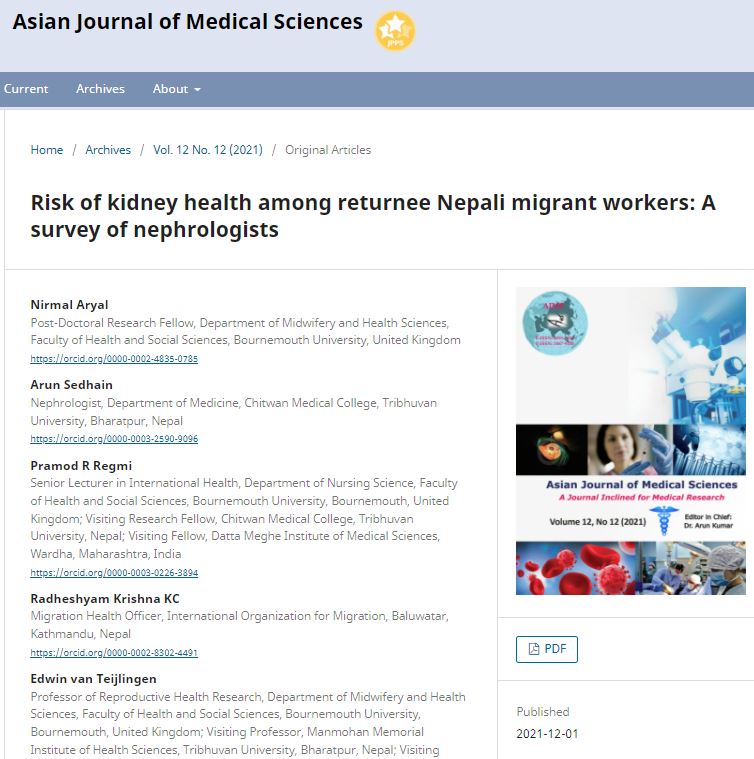 Congratulations to dr. Pramod Regmi on the publication today of our research article ‘Risk of Kidney health among returnee Nepali migrant workers: A survey of nephrologists‘ [1]. This paper was published today in the Asian Journal of Medical Sciences. It is co-authored with a clinician (a nephrologist) and a migration and health expert in Nepal. This paper reports on the Bournemouth University-led study with kidney specialists in Nepal which was reported in The Sunday Times under the heading ‘Qatar 2022: Dying for the World Cup‘ a fortnight ago.
Congratulations to dr. Pramod Regmi on the publication today of our research article ‘Risk of Kidney health among returnee Nepali migrant workers: A survey of nephrologists‘ [1]. This paper was published today in the Asian Journal of Medical Sciences. It is co-authored with a clinician (a nephrologist) and a migration and health expert in Nepal. This paper reports on the Bournemouth University-led study with kidney specialists in Nepal which was reported in The Sunday Times under the heading ‘Qatar 2022: Dying for the World Cup‘ a fortnight ago.
 Last Saturday Dr. Nirmal Aryal (now researcher at the Greater Manchester Mental Health NHS Foundation Trust and BU Visiting Faculty) and Dr. Regmi presented this research at a webinar in Nepal which was well attended and shown on Facebook Life.
Last Saturday Dr. Nirmal Aryal (now researcher at the Greater Manchester Mental Health NHS Foundation Trust and BU Visiting Faculty) and Dr. Regmi presented this research at a webinar in Nepal which was well attended and shown on Facebook Life.
Yesterday the Journal of Health Promotion published another Bournemouth University co-authored paper on health and migration with the title ‘Perceived threats towards COVID-19 pandemic among Nepali migrant workers returned from India’. Both paper are published Open Access and, as such, freely available across the globe to anyone with internet access!
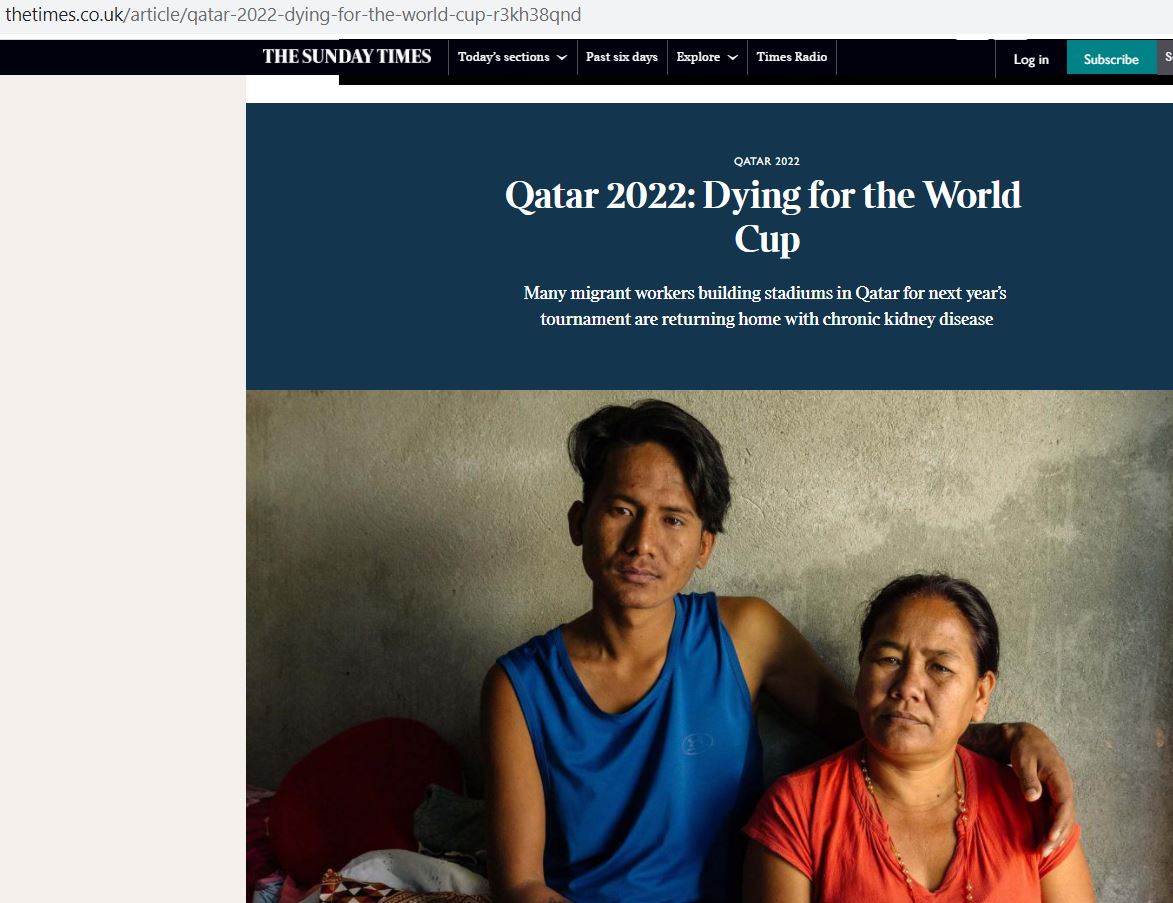
References:
- Aryal, N., Sedhain, A., Regmi, P.R., KC, R.K.,& van Teijlingen, E. (2021). Risk of kidney health among returnee Nepali migrant workers: A survey of nephrologists. Asian Journal of Medical Sciences, 12(12), 126–132.
- Khanal, S. P., van Teijlingen, E., Sharma, M. K., Acharya, J., & Sharma, S. (2021). Perceived threats towards COVID-19 pandemic among Nepali migrant workers returned from India. Journal of Health Promotion,9(01), 87–99.
Peer-reviewing ten years on
The process of peer review is widely recognised as the key element of quality control in academic publishing and the scientific community more generally. Peer review is the critical appraisal of one’s work by fellow scholars, who read and comment on your manuscript and offered a verdict on its quality, rigour, originality, style, completeness, etc. etc. 
Peer reviewers are typically experts in your field, if not your topic, or who have expertise in the methods you applied or the population or are you studied. They are also academics often with busy day jobs, who act as unpaid peer reviewers, and as journal editors for that matter. Peer reviewers are with full-time jobs who give up their free time to review for academic journals. A recent article by Aczel and colleagues (2021) reported that reviewers across the globe spent over 100 million hours on peer reviewing for free in 2020, the estimated value of this equated to nearly £300 million in the UK alone. This quantifies in some of my feelings I wrote about a decade ago now in a BU Research Blog with the title ‘Peer review and bust academics’.
However, with the ever-growing number of health and social science journals the requests for reviewing seem to grow relentlessly. This month alone (November 2021) I received twenty or 21 requests to review. I have reviewed three manuscripts for Birth, Nepal Journal of Epidemiology, and The Journal of International Development, but I had to reject or ignore many more (see Table 1). I usually do my reviews over the weekend. One weekend this month I could not review because I had to prepare materials for the external auditor who came to visit Bournemouth University for a project recently completed, and this weekend I could not find the time because I’m proof-reading two PhD chapters (and writing this blog).
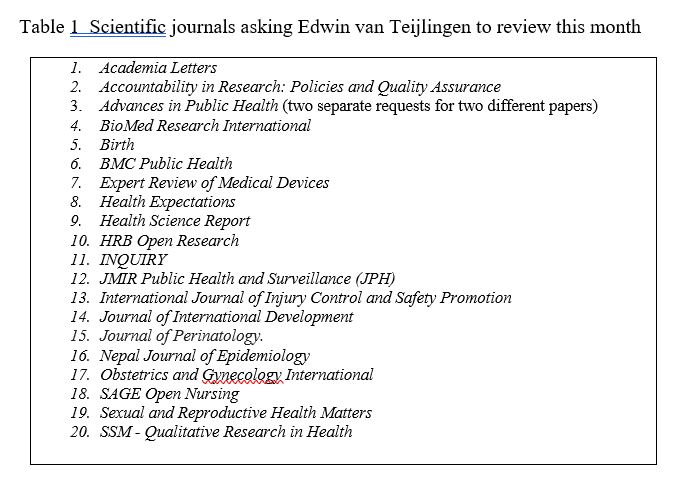
I leave you with some food for thought: academics spent time applying for research funding, then apply for the ethical approval, do the research, we write up the findings, and write blogs about the process!
Prof. Edwin van Teijlingen
Centre for Midwifery, Maternal & Perinatal Health (CMMPH)
Reference:
Aczel, B., Szaszi, B., Holcombe, A.O. (2021) A billion-dollar donation: estimating the cost of researchers’ time spent on peer review. Res Integr Peer Rev 6, 14. https://doi.org/10.1186/s41073-021-00118-2.
Health & well-being of Nepal’s migrant workers
 Dr. Pramod Regmi, Senior Lecturer in International Health in the Department of Nursing Science, has been invited to speak at the forthcoming NIRI Webinar on this Saturday (27th November 2021). He will be jointly presenting with Dr. Nirmal Aryal, Visiting Faculty at the Department of Health & Social Sciences (FHSS). Pramod and Nirmal will be speaking on ‘The hidden health costs of Nepali labour migrants’, following the coverage of Bournemouth University’s research on this topic in The Sunday Times the weekend before last.
Dr. Pramod Regmi, Senior Lecturer in International Health in the Department of Nursing Science, has been invited to speak at the forthcoming NIRI Webinar on this Saturday (27th November 2021). He will be jointly presenting with Dr. Nirmal Aryal, Visiting Faculty at the Department of Health & Social Sciences (FHSS). Pramod and Nirmal will be speaking on ‘The hidden health costs of Nepali labour migrants’, following the coverage of Bournemouth University’s research on this topic in The Sunday Times the weekend before last.
NIRI (Nexus Institute of Research and Innovation) is a not-for-profit-sharing institution established by Nepalese scientists, academics, and social workers with a common goal of fostering research and innovation in Nepal. The session will be presented ‘live’ on Facebook.
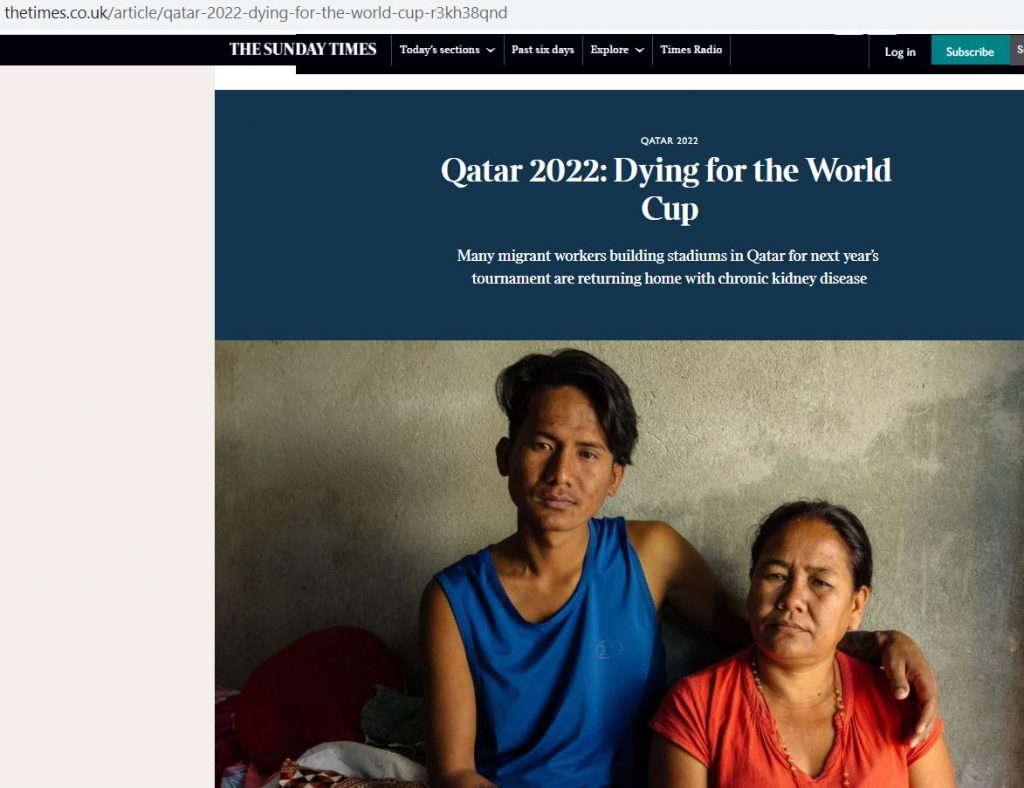
Well done!
Prof. Edwin van Teijlingen
Centre for Midwifery, Maternal & Perinatal Health
Wessex REACH Initiative – Peer support grant

The Wessex REACH Initiative was formally launched in the summer and their first newsletter can be found here.
Wessex REACH are offering a small amount of funding to groups of researchers who wish to create a space for thinking, connecting and problem solving with their peers. By coming together in face-to-face peer group meetings, research ideas and local problems can be discussed, common challenges and possible solutions can be shared and learn from one another. Whether you want to meet for afternoon tea away from the office a few times a year or fund a grant writing away day or any other creative solution that suits your group, they are interested in receiving your applications.
Who is eligible?
Anyone currently working in healthcare, social care or in healthcare-related research in Wessex.
How much is available?
Each group can apply for up to £500 to be used over a 1 year period. They are aiming to fund up to 4 groups in the first round. All applications will be reviewed by the Wessex REACH Steering Group and successful applicants notified early in 2022.
How to apply?
Send a short summary (up to 500 words) to info@wessexreach.org.uk by 10 December 2021. This summary should include the following information, which will be used in the shortlisting process:
- Contact details for your group or an expression of interest in being part of a group in your area
- Your reasons for applying and how the award will help to build research capacity in your group
- Your planned event(s)/activity
- What your group is hoping to achieve and how it aligns with building research capacity in the Wessex region
- What facilitation support, if any, you would like from the Wessex REACH Exec Committee (https://www.wessexreach.org.uk/meet-the-team )
- Requested total budget
Questions
If you would like to discuss your eligibility or plans prior to applying please contact Beth Stuart (bls1@soton.ac.uk)
Free training sessions for dementia researchers
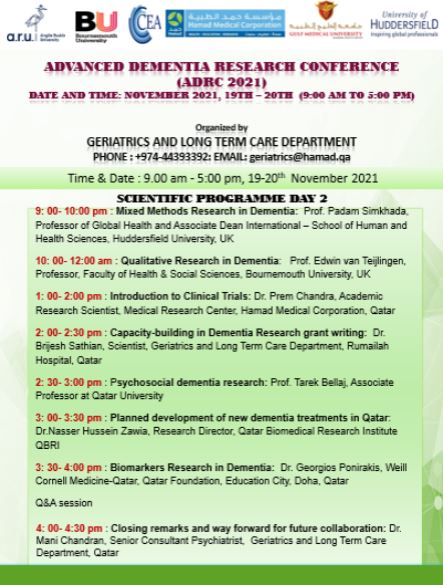 Bournemouth University is involved in a wider collaboration which organises the Advanced Dementia Research Conference (ADRC 2021). The conference is delivered online today and tomorrow (19th-20th November). ADRC 2021 is led by Dr. Brijesh Sathian, BU Visiting Faculty, based in the Geriatric Medicine Department, Rumailah Hospital, in Doha, Qatar. Saturday morning Prof. Edwin van Teijlingen will be delivering a session on qualitative research, preceded by a session on mixed-methods research from Prof. Padam Simkhada, also BU Visiting Faculty, from the University of Huddersfield.
Bournemouth University is involved in a wider collaboration which organises the Advanced Dementia Research Conference (ADRC 2021). The conference is delivered online today and tomorrow (19th-20th November). ADRC 2021 is led by Dr. Brijesh Sathian, BU Visiting Faculty, based in the Geriatric Medicine Department, Rumailah Hospital, in Doha, Qatar. Saturday morning Prof. Edwin van Teijlingen will be delivering a session on qualitative research, preceded by a session on mixed-methods research from Prof. Padam Simkhada, also BU Visiting Faculty, from the University of Huddersfield.
The programme shown is for Day 2 tomorrow. All sessions today and tomorrow are free to attend! You can register here! Please, note that advertised times a Qatar times which three hours ahead of the UK at the moment.
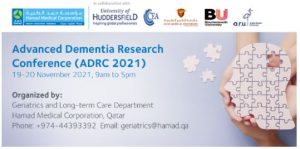
Prof. Edwin van Teijlingen
CMMPH (Centre for Midwifery, Maternal & Perinatal Health)
Bournemouth research cited in The Sunday Times
 Today Bournemouth University’s research on Nepali migrant workers and kidney problems was cited in The Sunday Times. In the preparation for the Qatar 2022 men’s football world cup The Sunday Times published an article under the title ‘Dying for the World Cup‘.
Today Bournemouth University’s research on Nepali migrant workers and kidney problems was cited in The Sunday Times. In the preparation for the Qatar 2022 men’s football world cup The Sunday Times published an article under the title ‘Dying for the World Cup‘.
 Dr. Pramod Regmi and Dr. Nirmal Aryal were awarded funding from GCRF (The Global Challenges Research Fund) and Bournemouth University’s QR fund. This work resulted in an editorial highlighting that low-skilled migrant workers in the Middle Wast and Malaysia are at a disproportionately higher risk of kidney problems. The working conditions are often Dirty, Dangerous and Difficult (referred at as the 3Ds) include physically demanding work, exposure to a hot environment, dehydration, chemical exposures, excessive use of pain killers, and lifestyle factors (such as restricted water intake and a high intake of alcohol/sugary drinks) which may precipitate them to acute kidney injuries and subsequent chronic kidney disease [1]. And recently, a national survey of nephrologists (kidney specialists) on their perceptions of the size of the problem of kidney health in Nepali migrant workers [2].
Dr. Pramod Regmi and Dr. Nirmal Aryal were awarded funding from GCRF (The Global Challenges Research Fund) and Bournemouth University’s QR fund. This work resulted in an editorial highlighting that low-skilled migrant workers in the Middle Wast and Malaysia are at a disproportionately higher risk of kidney problems. The working conditions are often Dirty, Dangerous and Difficult (referred at as the 3Ds) include physically demanding work, exposure to a hot environment, dehydration, chemical exposures, excessive use of pain killers, and lifestyle factors (such as restricted water intake and a high intake of alcohol/sugary drinks) which may precipitate them to acute kidney injuries and subsequent chronic kidney disease [1]. And recently, a national survey of nephrologists (kidney specialists) on their perceptions of the size of the problem of kidney health in Nepali migrant workers [2].
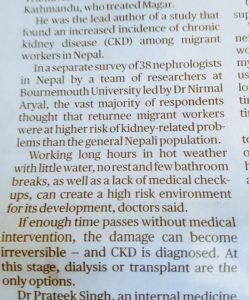
References:
- Aryal, N., Regmi, P.R., Sedhain, A., KC, R.K., Martinez Faller, E., Rijal, A., van Teijlingen, E. (2021). Kidney health risk of migrant workers: An issue we can no longer overlook. Health Prospect 21(1): 15-17.
- Aryal, N., Sedhain, A., Regmi, P., KC, R. K., van Teijlingen, E. (2021). Risk of kidney health among returnee Nepali migrant workers: A survey of nephrologists. Asian Journal of Medical Sciences 12(12), 126–132.
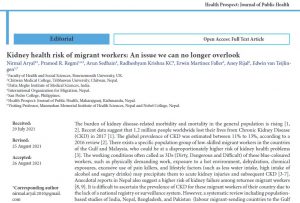
Not going in!
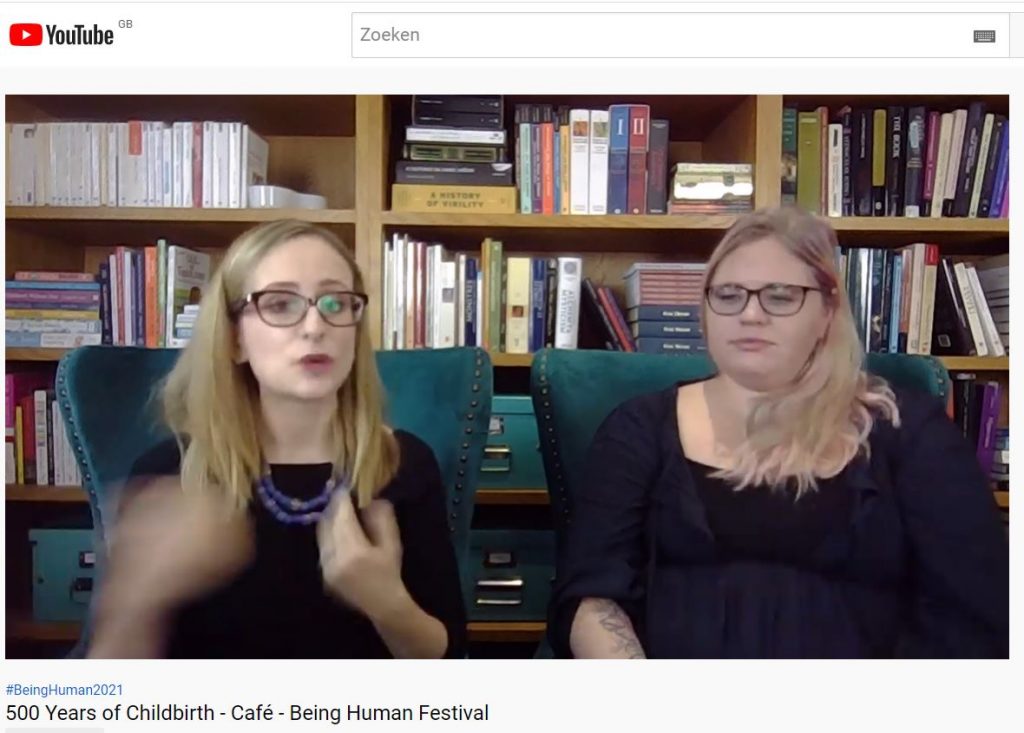 Yesterday I had the pleasure of attending the online workshop ‘500 Years of Childbirth’ together with by CMMPH (Centre for Midwifery, Maternal & Perinatal Health) colleges Dr. Juliet Wood and Dr. Laura Iannuzzi. The session ‘500 Years of Childbirth’ was part of Being Human Festival, the UK’s national festival of the humanities which runs 11–20 November 2021. History has always been a passion of me, and the presenters, Julia Martins and Carly Lokrheim, linked early modern history with childbirth in the 21st century.
Yesterday I had the pleasure of attending the online workshop ‘500 Years of Childbirth’ together with by CMMPH (Centre for Midwifery, Maternal & Perinatal Health) colleges Dr. Juliet Wood and Dr. Laura Iannuzzi. The session ‘500 Years of Childbirth’ was part of Being Human Festival, the UK’s national festival of the humanities which runs 11–20 November 2021. History has always been a passion of me, and the presenters, Julia Martins and Carly Lokrheim, linked early modern history with childbirth in the 21st century. 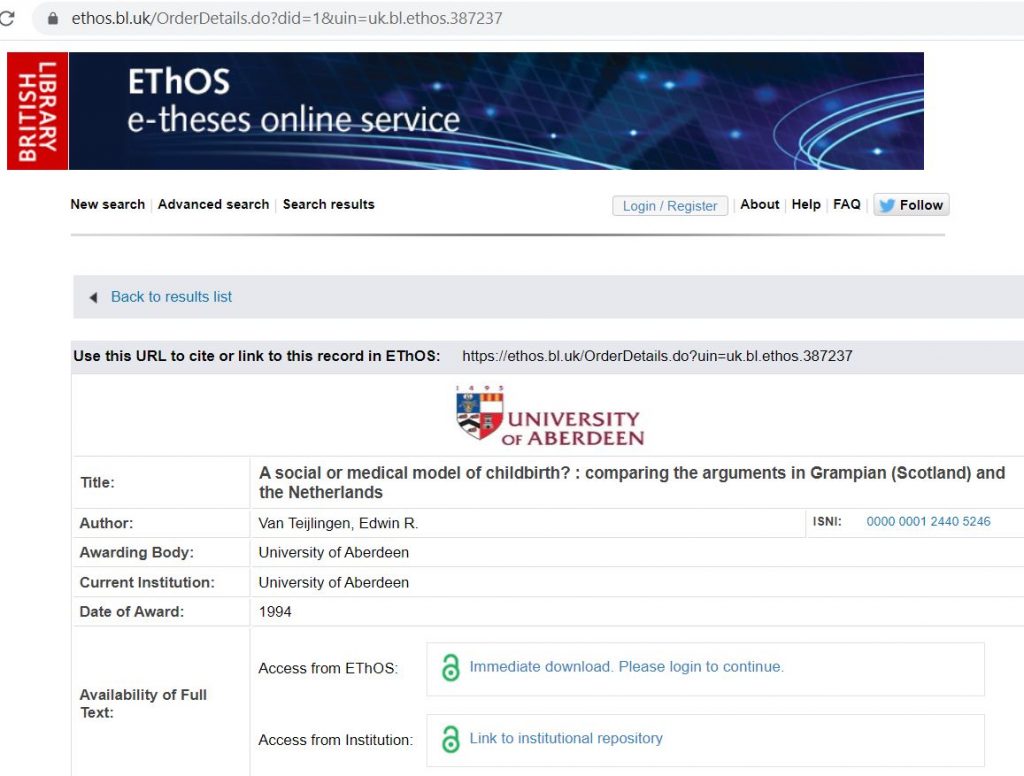
This wonderful session reminded me of my draft chapter I wrote for my PhD thesis three decades ago. My thesis A social or medical model of childbirth? : comparing the arguments in Grampian (Scotland) and the Netherlands at the University of Aberdeen was supervised by Dr. Peter McCaffery. Peter wisely said to me: “You really needed to write this chapter to make sense of the history of midwifery in your head, but it does not really fit the thesis.” He added: “You have too many words already. You know that it is not going in?” The material of this history chapter was not lost as I used loads of text from it it in the introduction section for a textbook [1]. The section ‘History of Midwifery: Introduction’ became part of our edited volume Midwifery and the Medicalization of Childbirth: Comparative Perspectives (Nova Science Publishers, Inc., Huntington, New York, USA) [2].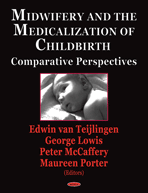
It is a message I occasionally repeat to my own PhD students. Under the circumstances I may fing myself saying things like “This is something you had to get of your chest, or you had to write it to make sense of it, but as it stands do you think it fits your argument?” Or more subtly in a supervision meeting, tell us: “What does this section add to your overall story in the thesis?”
Prof. Edwin van Teijlingen
CMMPH
References:
- van Teijlingen, E. (2004) History of Midwifery: Introduction, In: van Teijlingen, E. Lowis, G., et al. (eds.), Midwifery & the Medicalization of Childbirth, NY: Nova Sci., pages: 43-52.
- van Teijlingen , E., Lowis, G., McCaffery, P. & Porter, M. (eds.) (2004) Midwifery and the Medicalization of Childbirth: Comparative Perspectives, New York: Nova Science. [Paperback ISBN: 1-59454-0314].
NIHR Bulletin

RDS NEWS
New RDS event: Virtual Grant Development & Writing Workshop
We’re pleased to announce that we’ve just opened registration for the new Virtual Grant Development & Writing Workshop which will take place on the 23rd and 24th November 2021.
This is a 2-day workshop that we’re hosting in partnership with the RDS North East and North Cumbria. The 2-day workshop will provide a great opportunity to help researchers to make progress in developing their NIHR research proposal into a competitive application. Find out more.
NIHR News
NIHR welcomes Government investment in health R&D
eBulletins and Newsletters
NIHR News and Research: October 2021
NHS England and NHS Improvement: In Touch
Events
NIHR Research for Social Care (RfSC) Call Seminar: 25th November 2021, 1.30pm – 3.00pm
An event specifically for social care researchers, practitioners and users to introduce the latest call from the NIHR’s RfSC programme. Speakers include the RfSC Programme Team, the RfSC committee chair, and others including Dr Mark Wilberforce (a successful candidate), Autistica, and a public involvement expert. The remit of the call, requirements and applications processes will be covered. Find out more
Funding Opportunities
Public Health Research (PHR) Programme
21/568 Suicide prevention in high risk groups
21/569 Effectiveness of interventions aimed at preventing domestic abuse
21/570 What are the health and health inequality impacts of being outdoors for children and young people?
21/571 Digital health inclusion and inequalities
21/572 Increasing uptake of vaccinations in populations where there is low uptake
Your local branch of the NIHR RDS (Research Design Service) is based within the BU Clinical Research Unit (BUCRU) should you need help with your application. We advise on all aspects of developing an application and can review application drafts as well as put them to a mock funding panel (run by RDS South West) known as Project Review Committee, which is a fantastic opportunity for researchers to obtain a critical review of a proposed grant application before this is sent to a funding body.
Contact us as early as possible to benefit fully from the advice
Feel free to call us on 01202 961939 or send us an email.
VOICE@BU
BU PIER and BUCRU are holding a drop in event on 4th November 10am-3pm, outside BG117.
Come and join us for an informal chat about getting the public involved in your research. (There might be some chocolate too).
Do you have a question you’d like to ask members of the public? An event you’d like them to attend? Come along and sign up to VOICE, a new collaboration and digital platform for coordinating and supporting public involvement in research.
An increasing number of researchers across BU are involving and wanting to involve people with lived experience in shaping and informing research. VOICE@BU brings together the public involvement work of the PIER (Public Involvement in Education and Research) Partnership, BUCRU (BU Clinical Research Unit) and the Dorset and Salisbury office of the NIHR Research Design Service South West (RDS SW) to support and facilitate public involvement in research at BU.
VOICE@BU includes:
Mel Hughes, Pete Atkins and Angela Warren from the BU PIER Partnership
Helen Allen and Louise Ward from BUCRU and the NIHR Research Design Service South West (RDS SW)
Colleagues from the Faculty of Health and Social Sciences based research centres e.g. ADRC
Colleagues from BU Research Development & Support (RDS) Team (for coordinating public engagement)
In May we ran a demonstration of VOICE you can view the recording here
To summarise, researchers can:
- Easily and quickly register for VOICE
- Submit an opportunity request to involve members of the public in their research
- Use the digital tools the platform offers to involve members of the public in research
- Promote workshops/focus groups
- Facilitate online discussions
- Promote opportunities for the public to join steering groups
- Online surveys & polls
- Set timed challenges and encourage ideas from the community (bring your ideas and questions along and chat through at our drop in)
- Set up a closed group to communicate, share documents and support an established public involvement group
- Communicate with VOICE members regarding specific opportunities
- Access and share support and learning resources to help patient and public involvement and engagement activities
You can register with VOICE and explore what is available and email us: voice@bournemouth.ac.uk to discuss how we can help get the public involved in your research and/or promote an event/opportunity to VOICE members.
Come and see us on Thursday 4th November 10am-3pm, outside BG117 in the Bournemouth Gateway Building
Two scholarships in one month for PhD student
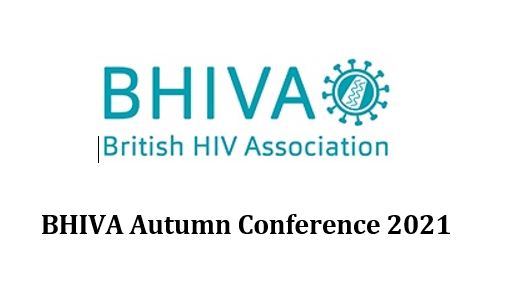 Congratulations to PhD student Abier Hamidi on winning two scholarships within weeks. Earlier this month Abier was awarded a scholarship from the BHIVA (British HIV Association) to pay the registration fee for BHIVA Autumn Conference. This week she was also successful in getting a scholarship covering registration for the ‘Arab Health Summit: Advancing Health Equity for Women’ to be held on October 19-21. The Arab Health Summit serves as a platform for researchers in the USA to connect with their global counterparts, including in the MENA (Middle Eastern and North African) region. This summit offers a unique opportunity for Abier to exchange ideas and develop research relationships that may support her PhD study.
Congratulations to PhD student Abier Hamidi on winning two scholarships within weeks. Earlier this month Abier was awarded a scholarship from the BHIVA (British HIV Association) to pay the registration fee for BHIVA Autumn Conference. This week she was also successful in getting a scholarship covering registration for the ‘Arab Health Summit: Advancing Health Equity for Women’ to be held on October 19-21. The Arab Health Summit serves as a platform for researchers in the USA to connect with their global counterparts, including in the MENA (Middle Eastern and North African) region. This summit offers a unique opportunity for Abier to exchange ideas and develop research relationships that may support her PhD study. 
Abier is conducting a PhD on: ‘Perceptions of the Effectiveness of Health Education Strategies in Reducing Harm from HIV in Libyan Married Women’. Recently, she had her first PhD paper “HIV epidemic in Libya: Identifying gaps” accepted for publication by the Journal of the International Association of Providers of AIDS Care (JIAPAC) published by SAGE [1]. Abier’s PhD project is supervised by Dr. Pramod Regmi (Senior Lecturer in International Health) and Prof. Edwin van Teijlingen in the Centre for Midwifery, Maternal & Perinatal Health (CMMPH).
Reference:
- Hamidi, A., Regmi, P., van Teijlingen, E. HIV epidemic in Libya: Identifying gaps, Journal of the International Association of Providers of AIDS Care (JIAPAC) (forthcoming)
A small or a large national survey?
 Congratulations to Dr. Pramod Regmi and Dr. Nirmal Aryal on the acceptance of their paper ‘Risk of kidney health among returnee Nepali migrant workers: A survey of nephrologists’ [1]. This paper has been accepted by the Asian Journal of Medical Sciences, after having been rejected previous by another scientific journal . The reason for rejection was the small sample size of 38 nephrologists (=medical specialists in kidney disease). We think one of the reasons for acceptance of this research by the Asian Journal of Medical Sciences is the high proportion (74.5%) of all Nepal’s nephrologists who participated in this national study. Although the absolute number of participants is low there are only 51 kidney experts in the whole country and three-quarters took part in this study!
Congratulations to Dr. Pramod Regmi and Dr. Nirmal Aryal on the acceptance of their paper ‘Risk of kidney health among returnee Nepali migrant workers: A survey of nephrologists’ [1]. This paper has been accepted by the Asian Journal of Medical Sciences, after having been rejected previous by another scientific journal . The reason for rejection was the small sample size of 38 nephrologists (=medical specialists in kidney disease). We think one of the reasons for acceptance of this research by the Asian Journal of Medical Sciences is the high proportion (74.5%) of all Nepal’s nephrologists who participated in this national study. Although the absolute number of participants is low there are only 51 kidney experts in the whole country and three-quarters took part in this study!
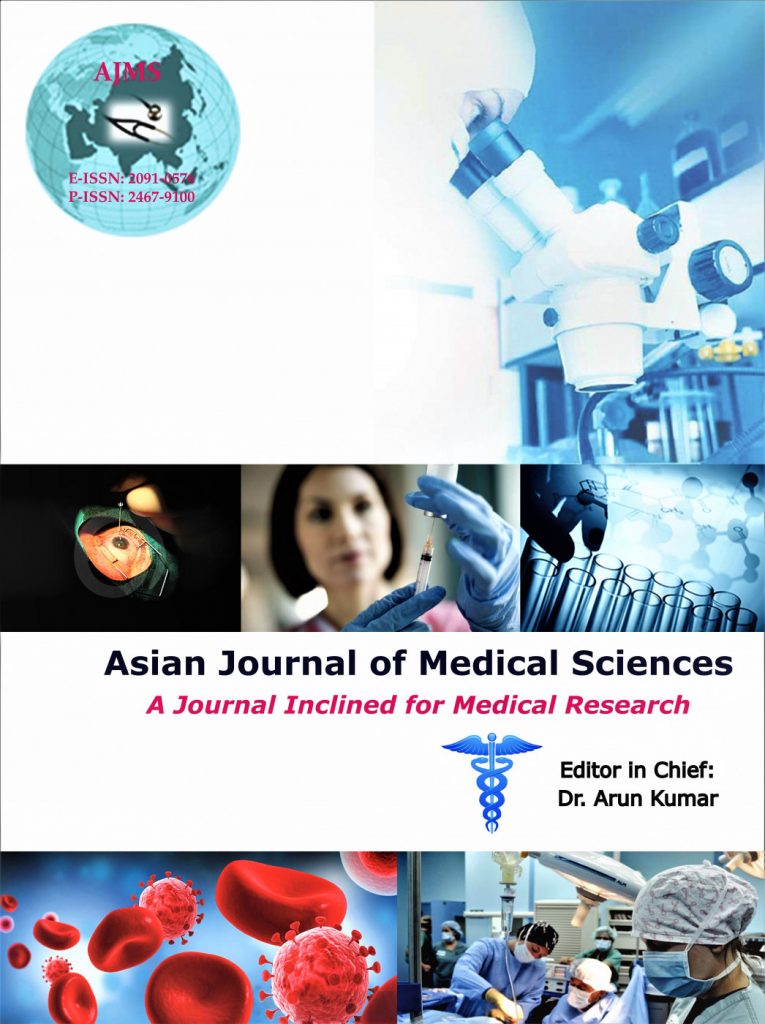 Dr. Nirmal Aryal was until recently based in the Department of Midwifery and Health Sciences and he will be starting later this month as a Research Associate at Greater Manchester Mental Health NHS Trust. Dr. Pramod Regmi is Senior Lecturer in International Health in the Department of Nursing Sciences. This paper was also co-authored with a nephrologist Dr. Arun Sedhai based in Chitwan (Nepal) and a public health expert based at the UN organisation, International Organization for Migration (IOM).
Dr. Nirmal Aryal was until recently based in the Department of Midwifery and Health Sciences and he will be starting later this month as a Research Associate at Greater Manchester Mental Health NHS Trust. Dr. Pramod Regmi is Senior Lecturer in International Health in the Department of Nursing Sciences. This paper was also co-authored with a nephrologist Dr. Arun Sedhai based in Chitwan (Nepal) and a public health expert based at the UN organisation, International Organization for Migration (IOM).
This paper which will be Open Access and hence freely available for any reader across the globe adds to the growing research evidence published by Bournemouth University’s researchers on migration and health, especially of migrants from Nepal [2-21].
Well done!
Prof. Edwin van Teijlingen
Centre for Midwifery, Maternal & Perinatal Health (CMMPH)
References:
- Aryal, N., Sedhain, A., Regmi, P.R., KC, R.K., van Teijlingen, E. (2021) ‘Risk of kidney health among returnee Nepali migrant workers: A survey of nephrologists’, Asian Journal of Medical Sciences (accepted).
- Simkhada, B., Vahdaninia, M., van Teijlingen, E., Blunt, H. (2021) Cultural issues on accessing mental health services in Nepali and Iranian migrants communities in the UK, International Journal of Mental Health Nursing (accepted). https://doi.org/10.1111/inm.12913
- Adhikary, P., Aryal, N., Dhungana, R.R., KC, R.K., Regmi, P.R., Wickramage, K.P., Duigan, P., Inkochasan, M., Sharma, G.N., Devkota, B., van Teijlingen, E., Simkhada, P. (2020) Accessing health services in India: experiences of seasonal migrants returning to Nepal. BMC Health Services Research 20, 992. https://doi.org/10.1186/s12913-020-05846-7
- IOM [International Organization for Migration]. (2019) Health vulnerabilities of cross-border migrants from Nepal. Kathmandu: International Organization for Migration.
- Aryal, N., Regmi, P.R., van Teijlingen, E., Trenoweth, S., Adhikary, P., Simkhada, P. (2020) The Impact of Spousal Migration on the Mental Health of Nepali Women: A Cross-Sectional Study, International Journal of Environmental Research & Public Health 17(4), 1292; https://doi.org/10.3390/ijerph1704129
- Regmi, P., Aryal, N., van Teijlingen, E., Adhikary, P. (2020) Nepali migrant workers and the need for pre-departure training on mental health: a qualitative study, Journal of Immigrant & Minority Health 22, 973–981.
- Adhikary, P. van Teijlingen, E. (2020) Support networks in the Middle East & Malaysia: A qualitative study of Nepali returnee migrants’ experiences, International Journal of Occupational Safety & Health (IJOSH), 9(2): 31-35.
- Simkhada, B., Sah, R.K., Mercel-Sanca, A., van Teijlingen, E., Bhurtyal, Y.M., Regmi, P. (2020) Health and Wellbeing of the Nepali population in the UK: Perceptions and experiences of health and social care utilisation, Journal of Immigrant & Minority Health (accepted).
- Regmi, P., van Teijlingen, E., Mahato, P., Aryal, N., Jadhav, N., Simkhada, P., Syed Zahiruddin, Q., Gaidhane, A., (2019) The health of Nepali migrants in India: A qualitative study of lifestyles and risks, Journal of Environmental Research & Public Health 16(19), 3655; doi:10.3390/ijerph16193655.
- Dhungana, R.R., Aryal, N, Adhikary, P., KC, R., Regmi, P.R., Devkota, B., Sharma, G.N., Wickramage, K., van Teijlingen, E., Simkhada, P. (2019) Psychological morbidity in Nepali cross-border migrants in India: A community-based cross-sectional, BMC Public Health 19:1534 https://bmcpublichealth.biomedcentral.com/articles/10.1186/s12889-019-7881-z
- Aryal, N., Regmi, P.R., van Teijlingen, E., Simkhada, P., Mahato, P. (2019) Adolescents left behind by migrant workers: a call for community-based mental health interventions in Nepal. WHO South East Asia Journal of Public Health 8(1): 38-41.
- Aryal, N., Regmi, P.R., Faller, E.M,, van Teijlingen, E., Khoon, C.C., Pereira, A., Simkhada, P. (2019) ‘Sudden cardiac death and kidney health related problems among Nepali migrant workers in Malaysia’ Nepal Journal of Epidemiology 9(3): 755-758. https://www.nepjol.info/index.php/NJE/article/view/25805
- Adhikary P, van Teijlingen E., Keen S. (2019) Workplace accidents among Nepali male workers in the Middle East and Malaysia: A qualitative study, Journal of Immigrant & Minority Health 21(5): 1115–1122. https://link.springer.com/article/10.1007/s10903-018-0801-y
- Simkhada, P.P., van Teijlingen, E.R., Gurung, M., Wasti, S. (2018) A survey of health problems of Nepalese female migrants workers in the Middle-East & Malaysia, BMC International Health & Human Rights 18(4): 1-7. http://rdcu.be/E3Ro
- Adhikary P, Sheppard, Z., Keen S., van Teijlingen E. (2018) Health and well-being of Nepalese migrant workers abroad, International Journal of Migration, Health & Social Care 14(1): 96-105. https://doi.org/10.1108/IJMHSC-12-2015-0052
- Adhikary, P, Sheppard, Z., Keen, S., van Teijlingen, E. (2017) Risky work: accidents among Nepalese migrant workers in Malaysia, Qatar & Saudi Arabia, Health Prospect 16(2): 3-10.
- Simkhada, P.P., Regmi, P.R., van Teijlingen, E., Aryal, N. (2017) Identifying the gaps in Nepalese migrant workers’ health and well-being: A review of the literature, Journal of Travel Medicine 24 (4): 1-9.
- Aryal, N., Regmi, P.R., van Teijlingen, E., Simkhada, P., Adhikary, P., Bhatta, Y.K.D., Mann, S. (2016) Injury and Mortality in Young Nepalese Migrant Workers: A Call for Public Health Action. Asian-Pacific Journal of Public Health 28(8): 703-705.
- Sapkota, T., Simkhada, P., van Teijlingen, E. (2014) Nepalese health workers’ migration to United Kingdom: A qualitative study. Health Science Journal 8(1):57-74.
- Adhikary P, Keen S and van Teijlingen E (2011). Health Issues among Nepalese migrant workers in the Middle East. Health Science Journal.5 (3):169-i75 DOI: 2-s2.0-79960420128.
- Adhikary, P., Simkhada, P.P., van Teijlingen E., Raja, AE. (2008) Health & Lifestyle of Nepalese Migrants in the UK, BMC International Health & Human Rights 8(6). Web address: www.biomedcentral.com/1472-698X/8/6











 Writing policy briefs
Writing policy briefs Upholding Excellence: The Concordat to Support Research Integrity
Upholding Excellence: The Concordat to Support Research Integrity Today’s Documentation Will Serve Tomorrow’s Justice
Today’s Documentation Will Serve Tomorrow’s Justice Up2U: New BU academic publication
Up2U: New BU academic publication New BU midwifery paper
New BU midwifery paper ECR Funding Open Call: Research Culture & Community Grant – Application Deadline Friday 12 December
ECR Funding Open Call: Research Culture & Community Grant – Application Deadline Friday 12 December MSCA Postdoctoral Fellowships 2025 Call
MSCA Postdoctoral Fellowships 2025 Call ERC Advanced Grant 2025 Webinar
ERC Advanced Grant 2025 Webinar Horizon Europe Work Programme 2025 Published
Horizon Europe Work Programme 2025 Published Horizon Europe 2025 Work Programme pre-Published
Horizon Europe 2025 Work Programme pre-Published Update on UKRO services
Update on UKRO services European research project exploring use of ‘virtual twins’ to better manage metabolic associated fatty liver disease
European research project exploring use of ‘virtual twins’ to better manage metabolic associated fatty liver disease